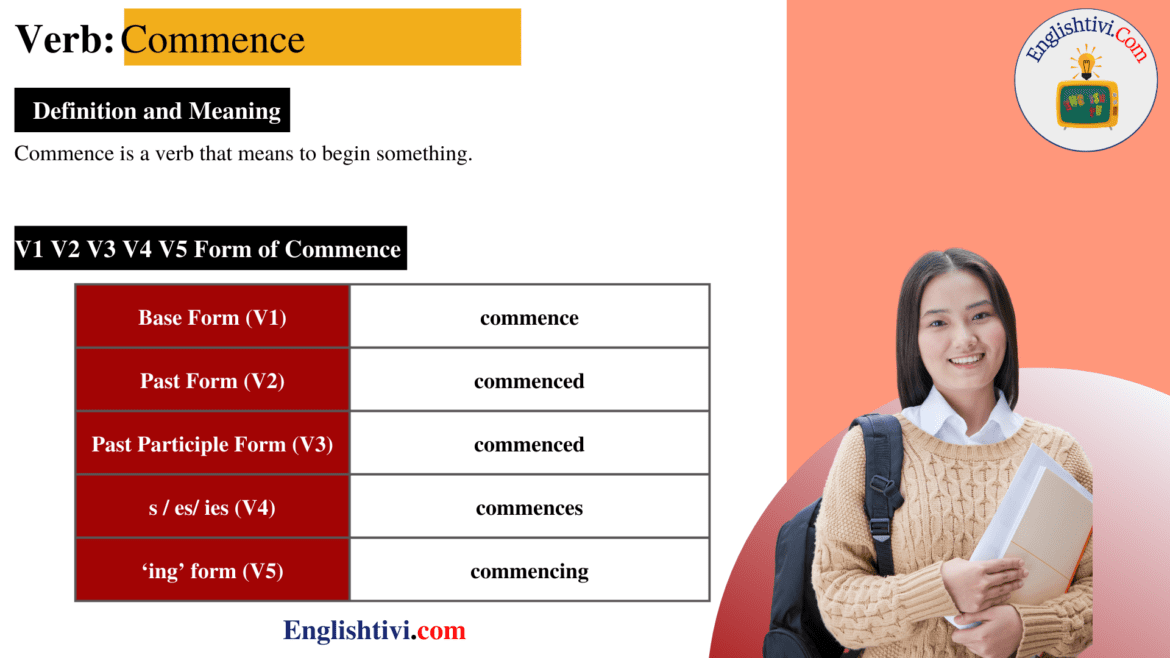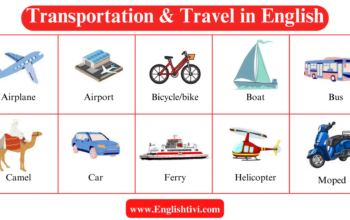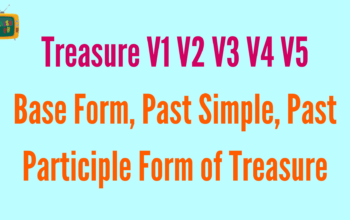Commence V1 V2 V3 V4 V5 is one of the verbs that are used very commonly in English tests as well as in everyday communication. Also, because it’s an irregular verb, commence doesn’t follow the regular rule. The verb “ commence” has five different forms: base form, past simple, past participle form, present perfect, and present perfect participle. So what is commence‘s past? How do conjugate verbs with commence verbs?
⏩ Sign Up to Get Bonus
Let’s find out with English tivi in the article below.
See more at: Verbs
Commence of Definition and Meaning
Commence is a verb that means to begin something
V1 V2 V3 V4 V5 Form of commence
| Base Form (V1) | commence |
| Past Form (V2) | commenced |
| Past Participle Form (V3) | commenced |
| s / es/ es (V4) | commences |
| ‘ing’ form (V5) | commencing |
Commence of Past Simple V2
The verb commence is also employed in its V2 form as commenced”. It is used to indicate the past tense in sentences.
Commence of Past Participle V3
This verb’s V3 form is commenced‘. In the case of past perfect tense or present perfect tense, the word commenced‘ is used.
+ In the present perfect tense, the word commence is used ‘have +’commenced’ or ‘has +’commenced.’
- I, you, and we are used as ‘have + ‘commenced‘ subjects.
- He, she, and it are used as ‘has +’commenced’ subjects.
+ If you need to use the past perfect tense, use ‘had +’commenced‘ regardless of the subject.
You might also like: ALL the English Grammar Basics You Need
Conjugation of Commence V1 V2 V3 V4 V5
| Conjugation table: Commence | |||
| Number | Singular | ||
| Present Simple of commence | I | You | She/He/It |
| commence | commence | commences | |
| Plural | |||
| We | You | They | |
| commence | commence | commence | |
| Present Continuous of commence | I | You | She/He/It |
| am commencing | are commencing | is commencing | |
| Plural | |||
| We | You | They | |
| are commencing | are commencing | are commencing | |
| Present Perfect of commence | I | You | She/He/It |
| have commenced | have commenced | has commenced | |
| Plural | |||
| We | You | They | |
| have commenced | have commenced | have commenced | |
| Present Perfect Continuous of commence | I | You | She/He/It |
| have been commencing | have been commencing | has been commencing | |
| Plural | |||
| We | You | They | |
| have been commencing | have been commencing | have been commencing | |
| Past Simple of commence | I | You | She/He/It |
| commenced | commenced | commenced | |
| Plural | |||
| We | You | They | |
| commenced | commenced | commenced | |
| Past Continuous of commence | I | You | She/He/It |
| was commencing | were commencing | was commencing | |
| Plural | |||
| We | You | They | |
| were commencing | were commencing | were commencing | |
| Past Perfect of commence | I | You | She/He/It |
| had commenced | had commenced | had commenced | |
| Plural | |||
| We | You | They | |
| had commenced | had commenced | had commenced | |
| Past Perfect Continuous of commence | I | You | She/He/It |
| had been commencing | had been commencing | had been commencing | |
| Plural | |||
| We | You | They | |
| had been commencing | had been commencing | had been commencing | |
| Future Simple of commence | I | You | She/He/It |
| will/shall commence | will/shall commence | will/shall commence | |
| Plural | |||
| We | You | They | |
| will/shall commence | will/shall commence | will/shall commence | |
| Future Continuous of commence | I | You | She/He/It |
| will/shall be commencing | will/shall be commencing | will/shall be commencing | |
| Plural | |||
| We | You | They | |
| will/shall be commencing | will/shall be commencing | will/shall be commencing | |
| Future Perfect of commence | I | You | She/He/It |
| will/shall have commenced | will/shall have commenced | will/shall have commenced | |
| Plural | |||
| We | You | They | |
| will/shall have commenced | will/shall have commenced | will/shall have commenced | |
| Future Perfect Continuous of commence | I | You | She/He/It |
| will/shall have been commencing | will/shall have been commencing | will/shall have been commencing | |
| Plural | |||
| We | You | They | |
| will/shall have been commencing | will/shall have been commencing | will/shall have been commencing | |
| Conditional Present of commence | I | You | She/He/It |
| would commence | would commence | would commence | |
| Plural | |||
| We | You | They | |
| would commence | would commence | would commence | |
| Conditional Perfect of commence | I | You | She/He/It |
| would have commenced | would have commenced | would have commenced | |
| Plural | |||
| We | You | They | |
| would have commenced | would have commenced | would have commenced | |
| Conditional Present Continuous of commence | I | You | She/He/It |
| would be commencing | would be commencing | would be commencing | |
| Plural | |||
| We | You | They | |
| would be commencing | would be commencing | would be commencing | |
| Conditional Perfect Continuous of commence | I | You | She/He/It |
| would have been commencing | would have been commencing | would have been commencing | |
| Plural | |||
| We | You | They | |
| would have been commencing | would have been commencing | would have been commencing | |
| Present Subjunctive of commence | I | You | She/He/It |
| commence | commence | commence | |
| Plural | |||
| We | You | They | |
| commence | commence | commence | |
| Past Subjunctive of commence | I | You | She/He/It |
| commenced | commenced | commenced | |
| Plural | |||
| We | You | They | |
| commenced | commenced | commenced | |
| Past Perfect Subjunctive of commence | I | You | She/He/It |
| had commenced | had commenced | had commenced | |
| Plural | |||
| We | You | They | |
| had commenced | had commenced | had commenced | |
| Imperative of commence | I | You | She/He/It |
| commence | |||
| Plural | |||
| We | You | They | |
| Let’s commence | commence | ||
See more at: Vocabulary
Example Sentences with Commence V1 V2 V3 V4 V5
In this section, we will learn about commence sentence examples:
- I will commence learning English
- I commenced speaking before all the guests
- I have commenced building the house for 2 months
- He commences planning the study of English methods
- He is commencing to adapt to his new environment
Synonym Words For Commence
Synonym of commence word list. Here are a variety of words whose meaning is nearly the synonym of commence:
- begin
- start
- open
- initiate
- inaugurate
- lead off
- embark on
- get
- going institute
- kick off
- launch start off
- enter on
- go about instigate
- launch into
- originate
- set about embark
- fall to get
- down to business
- get off
- get the ball rolling
Opposite Words For Commence
The antonym of commence word list. Here are some words that have nearly the opposite meaning as commence:
- conclude
- end
- finish
- terminate
- cease
- stop
- complete
- desist
- halt
- close
- wind up
- bring to
- an end come to
- an end quit
- discontinue
- drop
- abandon
- forgo
- eschew
- suspend
- avoid
- refrain
- abstain
- forbear
- belay
- kick
- surcease
You might also like: Best List of Irregular Verbs in English
Some Frequently Asked Questions About Commence (Verb)
What is the V1 V2 V3 V4 V5 of commence?
The past tense of commence is commenced. The third-person singular simple present indicative form of commence iscommences. The present participle of commence is commencing. The past participle of commence is commenced.
| Base Form (V1) | commence |
| Past Form (V2) | commenced |
| Past Participle Form (V3) | commenced |
| s / es/ ies (V4) | commences |
| ‘ing’ form (V5) | commencing |
What is the V2 and V3 form of commence?
+ The V2 and V3 form of commence is “ commenced“ and “commenced ”.
What is the sentence of commence?
What is the past tense V2 of commence?
+ The past tense of commence is “ commence“
What is the past tense V2 of commence?
+ The past participle of commence is “ commenced“
What is the present participle V5 of commence?
+ The present participle of commence is “ commencing”
Conclusion
Let’s learn with English TV the structure of the verb Commence V1 V2 V3 V4 V5: Base Form, Past Simple, Present Continuous and Present Continuous and Present Continuous and Present Continuous forms. We wish you all the best of luck.





